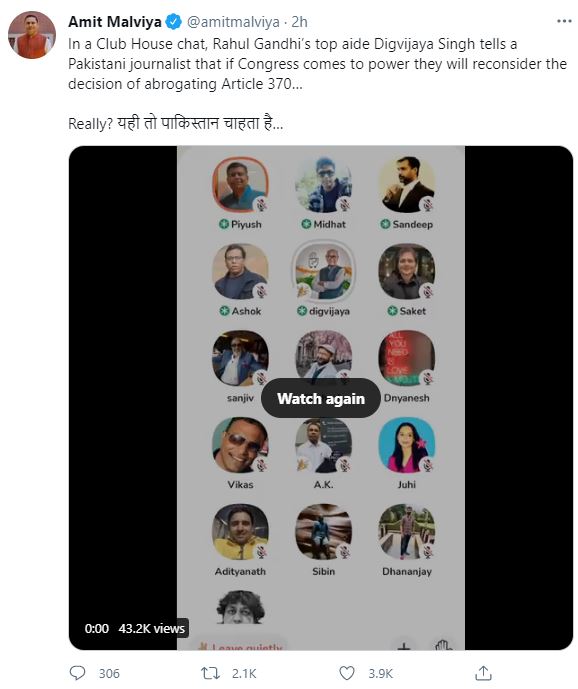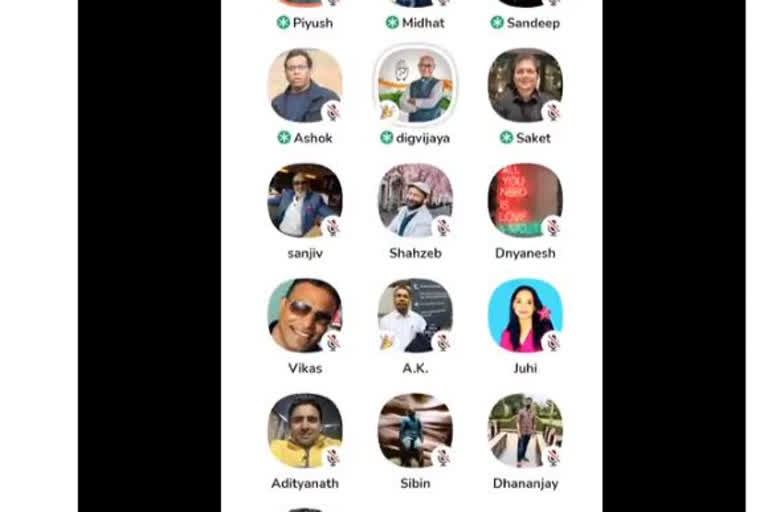New Delhi: An alleged chat between Congress' Digvijaya Singh and a Pakistani scribe on social media app 'Clubhouse' has raked a huge political storm, as the former MP CM is heard saying that if Congress comes to power Article 370 will be restored. This has created a flutter on social media and BJP leaders have asked as to what the Congress agenda will be on Jammu and Kashmir's integration with the Union. Digvijaya Singh is seen giving an answer to a Pakistani journalist on the question of Kashmir and India-Pakistan relations.
"When they revoked Article 370 then humanity was missing as Kashmiriyat is something which is basically fundamentals of secularism because in a Muslim-majority state there was a Hindu king and both worked together. In fact, the reservation in Kashmir was given to Kashmiri pandits in government services. Therefore, the decision of revoking Article 370 and reducing the statehood of Jammu and Kashmir is extremely a sad decision and the Congress party would certainly have to take a relook at this issue," said Digvijay Singh in a reply to a Pakistani journalist.
Amit Malviya, head of the BJP IT cell had tweeted the alleged clubhouse chat between Digvijay Singh and the journalist.

Speaking on the issue, BJP spokesperson Sambit Patra hit out at the Congress and Digvijay Singh on the alleged clubhouse leak (दिग्विजय सिंह का क्लब हाउस चैट लीक) saying the Congress needs to change its name from INC to ANC, which is Anti-National Clubhouse. Expressing his views on Singh's Clubhouse chat remark National Conference chief Farooq Abdullah said, "I'm very grateful to (Congress leader) Digvijaya Singh Ji. He has realized the sentiments of people as other parties who have also spoken about it. I welcome it heartily & hope govt will look into it again."
"Digvijaya Singh's comment is shameful. Congress leaders speak Pakistan's language. Pakistan wants reinstation of Article 370 & Digvijaya Singh is speaking their language. It is also part of toolkit campaign," said Former J&K Deputy CM Kavinder Gupta on Singh's alleged Clubhouse chat remark.
Madhya Pradesh CM Shivraj Singh Chouhan too slammed Digvijaya Singh over the alleged Clubhouse chat issue. "Congress is speaking the language of Pakistan. By restoring Article 370, does he (Congress leader Digvijaya Singh) want to fan the flames of terrorism & separatism in Kashmir? Sonia Gandhi, this country needs an answer from you," Shivraj Singh Chouhan, the MP CM said.
Meanwhile, Swami Anand Swarup, the chief seer of Shankaracharya Parishad retorted to Singh's comment on Article 370. He demanded that India should be declared as a Hindu nation. The seer said that he will submit a memorandum to President of India seeking to declare India a Hindu nation. Objecting to Singh's comment, he said that the Congress leader should be sent to jail.
What is Article 370?
Article 370 was included in the Indian Constitution on October 17, 1949, and it exempts Jammu and Kashmir from the Indian Constitution (except Article 1 and 370 itself) and it permits the state to draft its own constitution.
The Article states:
- The Article does not withstand anything in the Indian ConstitutionThe provisions of Article 238 shall not apply in relation to the State of Jammu and Kashmir
- It restricts Parliament’s legislative powers in respect of J&K. For extending a central law on subjects included in the Instrument of Accession (IoA), mere "consultation" with the state government is needed. But for extending it to other matters, "concurrence" of the state government is mandatory.
Article 370 and the Instrument of Accession
The history of Article 370 dates back to the Independence of British ruled India. the Instrument of Accession came into being when the Indian Independence Act,1947 divided British India into India and Pakistan. The Act provided some 600 princely states with three options:
- To remain an independent country
- To join the Dominion of India
- To join the Dominion of Pakistan
'If any of the princely states decided to join either of the countries', it had to be done through an Instrument of Accession.
The Act, however, did not describe any provisions for the IoA and left the conditions for any such contract to be decided by the state itself. But, it did state that agreement made between the country and the respective state needs to be honoured, and in case of any breach of contract, the general rule called for the status quo to be maintained.
When the Instrument of Accession for Jammu and Kashmir was signed on October 26, 1947, by Raja Hari Singh, the then ruler of Kashmir, he explicitly mentioned that the terms of "my Instrument of Accession cannot be varied by any amendment of the Act or of Indian Independence Act unless such amendment is accepted by me by an Instrument supplementary to this Instrument".
Clause 7 said:
"Nothing in this Instrument shall be deemed to commit me in any way to acceptance of any future constitution of India or to fetter my discretion to enter into arrangements with the Government of India under any such future constitution."
The IoA was accepted by the then Governor-General of India Lord Mountbatten on October 27, 1947.
In a policy decision, India had decided to settle all disputes related to the accession by taking the people's wishes into account instead of a unilateral decision made by the ruler of the princely state.
Article 370 was originally drafted by the Government of Jammu and Kashmir, and after several modifications and negotiations, Article 306A, now known as Article 370, was passed in the Constituent Assembly on May 27, 1949.
Is Article 370 a temporary provision?
Part XXI of the Constitution has three provisions - Temporary, Transitional and Special Provisions, and Article 370 is the first article in this part. This gives an impression that Article 370 is temporary in nature.
"Part XXI of the Constitution has three provisions - Temporary, Transitional and Special Provisions, and Article 370 is temporary in nature. The heading of this part itself explains that Article 370 is a temporary provision and not a special provision, hence providing temporary status to Kashmir and not a special status. This is what has led the government to believe that they can amend the law as it is a temporary one," said Constitutional expert Subhash Kashyap while speaking to ETV Bharat.
Article 370 (3) can be deleted by a mere Presidential Order. Such an order, however, needs to be preceded by the acceptance of J&K's Constituent Assembly. Since such an Assembly was dissolved on January 26, 1957, it is believed by some that it cannot be deleted anymore. However, some believe that it can be done with the concurrence of the state government.
Has Article 370 eroded?
Jawaharlal Nehru had said in Lok Sabha on November 27, 1963, that "Article 370 has eroded". India has used Article 370 at least 45 times to extend provisions of the Indian Constitution to J&K.



